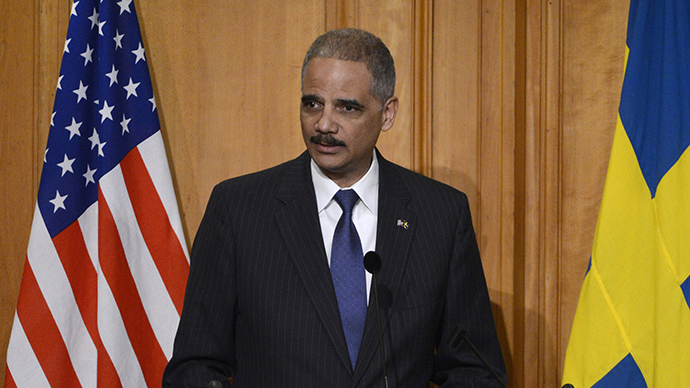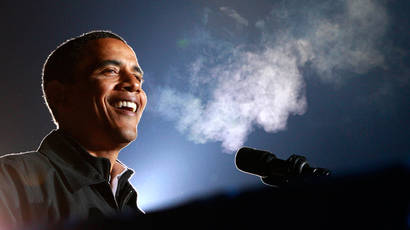Holder admits heroin is now 'urgent public health crises'

As deaths related to heroin and prescription drug overdose continue to rise, US Attorney General Eric Holder called the spike an “urgent public health crises” on Monday and pledged to expand the Justice Department’s effort to combat the problem.
Holder made the remarks in a video message posted on the Justice Department’s website, noting that fatalities caused by heroin overdose have risen 45 percent between 2006 and 2010.
"Addiction to heroin and other opiates -– including certain prescription pain-killers –- is impacting the lives of Americans in every state, in every region, and from every background and walk of life -– and all too often, with deadly results," he said.
The potential consequences of heroin were thrust into the spotlight again just over the weekend, when a video surfaced showing a woman allegedly under the influence of some kind of drug as her daughter worriedly tries to wake her up on a Pennsylvania bus. Police described the woman as “doing the ‘heroin nod,’” and have opened an investigation into the incident to ensure the child was not harmed by the behavior.
As part of the agency’s attempt to prevent such problems, Holder said the Justice Department would urge law enforcement agencies and first responders to improve their access to naloxone, an overdose-reversing drug that counteracts the effects of heroin and other opioids and restores breathing. He added that since 2001, naloxone has saved more than 10,000 lives.
The attorney general also stated that efforts to seize heroin and other opioids around the country have been expanded to target all levels of the supply chain – including those who prescribe, fill out, and distribute prescriptions illegally. Holder noted that between 2008 and 2013, there was a 320 percent increase in the amount of heroin confiscated near the border of the US and Mexico.
For many Americans, the death of Oscar-winning actor Philip Seymour Hoffman was an important reminder of the deadly toll heroin could exact on an individual. Hoffman was found dead in his apartment with a needle still in his arm, and autopsies showed a combination of heroin, cocaine, and other drugs in his body.

The actor’s death also came at a time when a particularly lethal batch of heroin made its way from Pennsylvania to the East Coast. The drug batch, which is laced with the powerful painkiller fentanyl, has been responsible for several dozen deaths in Maryland, New York, Pennsylvania, and Rhode Island.
Of course, Holder said enforcement alone won’t solve the situation at hand, acknowledging that effectively tackling the problem of heroin overdose simultaneously requires lessening abuse of prescription painkillers. As a result, the Justice Department will employ a combination of treatment and public health initiatives, such as using specialty courts connect convicted drug offenders with the appropriate services necessary “to avoid future drug use and rejoin their communities.”
"Scientific studies, federal, state and local investigations, addiction treatment providers, and victims reveal that the cycle of heroin abuse commonly begins with prescription opiate abuse,” he said. “The transition to -- and increase in -- heroin abuse is a sad but not unpredictable symptom of the significant increase in prescription drug abuse we’ve seen over the past decade."
As RT reported last year, there have been at least 20,000 fatalities a year linked to prescription drug overdoses since 1999, according to a report by the Centers for Disease Control and Prevention. In 2010, painkillers like OxyContin and Vicodin accounted for three out of four medication overdose deaths.
A separate 2013 report by the Department of Health and Human Services, meanwhile, flagged more than 700 Medicare doctors for overprescribing drugs that may not have been medically necessary.














